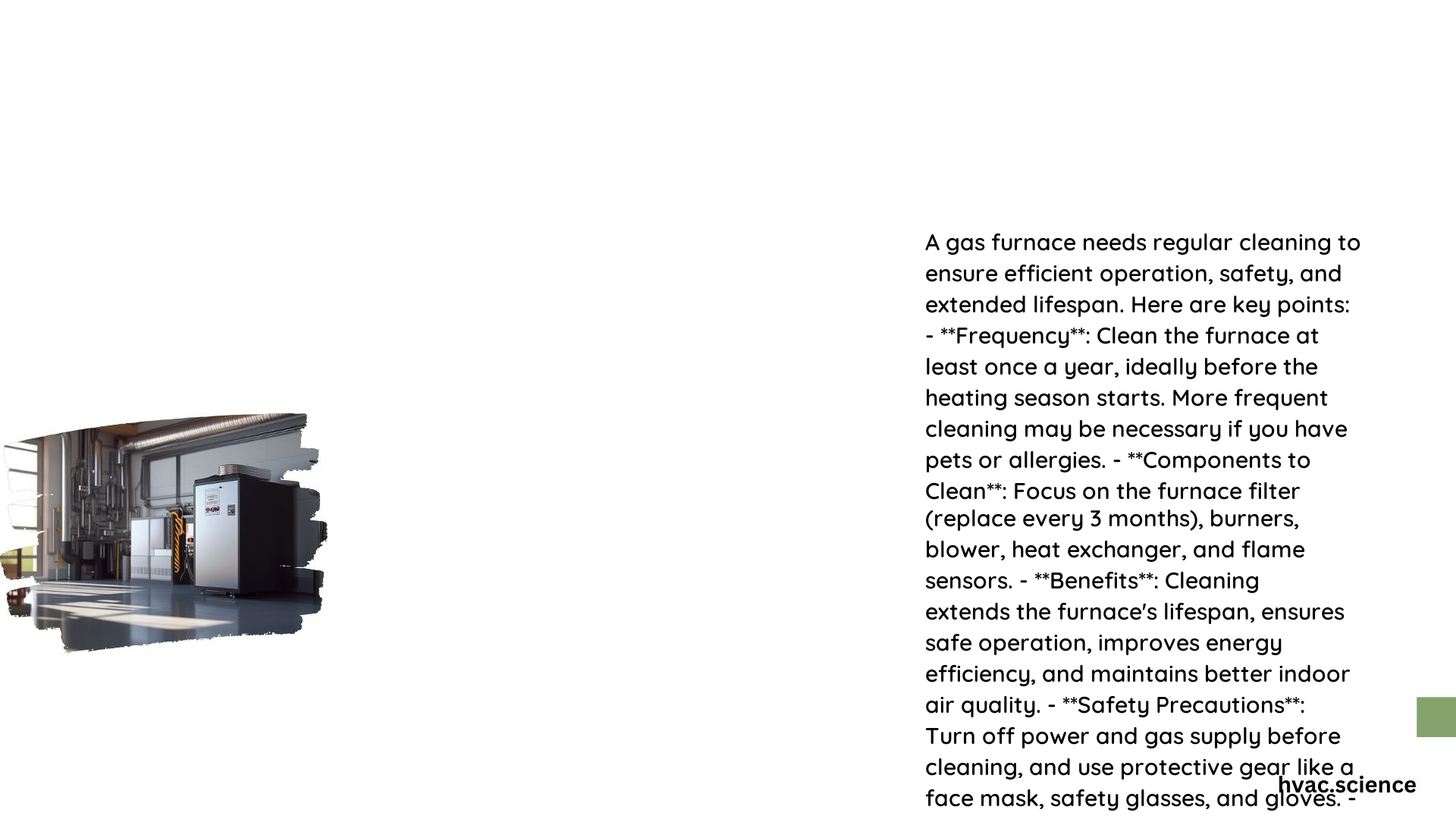Yes, a gas furnace needs to be cleaned regularly to ensure it operates efficiently, safely, and reliably. Regular cleaning helps maintain the furnace’s efficiency, improve indoor air quality, and extend its lifespan.
Why is Regular Cleaning Important for a Gas Furnace?
Efficiency
Accumulation of dust, dirt, and debris within the furnace components can reduce its efficiency. This buildup hinders airflow and heat transfer, causing the furnace to work harder and consume more energy, leading to higher utility bills.
Safety
A dirty furnace can pose significant safety risks, including the potential for carbon monoxide emissions and gas leaks. Regular cleaning helps ensure that all components are functioning correctly, minimizing these risks.
Air Quality
A clean furnace contributes to better indoor air quality by preventing the circulation of dust, allergens, and other particles that can exacerbate respiratory issues.
Extended Lifespan
Regular cleaning and maintenance can extend the lifespan of the furnace by identifying and addressing minor issues before they become major problems.
How Often Should a Gas Furnace Be Cleaned?

Annual Maintenance
It is highly recommended to have your gas furnace cleaned and inspected annually by a professional HVAC technician. This ensures that the furnace operates safely and efficiently.
Filter Changes
The furnace filter should be changed or cleaned regularly, typically every month to quarterly, depending on usage and the type of filter.
Can I Clean My Gas Furnace Myself?
While it is possible to perform some basic cleaning tasks yourself, it is advisable to have a professional HVAC technician conduct a thorough inspection and cleaning. However, here is a step-by-step guide for DIY cleaning:
Safety Precautions
- Turn off the furnace: Locate the shut-off valve on the gas line or electrical disconnect switch and turn off the power supply to your furnace before beginning any cleaning.
- Wear safety glasses and gloves: Protect your eyes and hands from dust and debris.
- Work in a well-ventilated area: Open windows and doors to ensure proper ventilation while cleaning.
Cleaning Essentials
- Shop vacuum with hose attachments: A powerful shop vacuum is ideal for removing dust and debris.
- Soft bristled brushes: Avoid using wire brushes or abrasive cleaners that could damage delicate components.
- Drop cloths: Lay down drop cloths around the furnace to catch any falling debris.
Cleaning Process
- Remove the furnace filter and replace it with a new one.
- Clean the blower compartment: Open the furnace access panel and carefully vacuum dust and debris from the blower compartment and fan blades.
- Clean the burners: For gas furnaces, you can often brush away dust and cobwebs from the burners. However, do not attempt to disassemble or adjust the gas burners, as this can be dangerous.
- Vacuum the heat exchanger: The heat exchanger is a crucial component that transfers heat from the combustion chamber to the air. Carefully vacuum any dust or debris around the heat exchanger.
What Tools and Materials are Needed for DIY Furnace Cleaning?
- Shop vacuum with hose attachments
- Soft bristled brushes
- Drop cloths
- Safety glasses and gloves
- New furnace filter
What are the Potential Costs for Furnace Cleaning?
Professional Cleaning
The national average cost for furnace cleaning falls within a specific range, often included in a tune-up package. This can vary but typically ranges from $100 to $300, depending on the services included.
DIY Cleaning
While DIY cleaning can save money, it is crucial to consider the potential risks and the importance of professional inspection for safety and efficiency.
What Measurements and Specifications Should Be Checked?
- Thermostat Calibration: Ensure the thermostat is calibrated correctly to maintain proper heating cycles and room air temperature.
- Air Flow: Measure for correct air flow to ensure proper operation and efficiency.
- Gas Pressure: Check and adjust gas pressure to reduce gas consumption while maximizing heating capacity.
Reference:
1. The Benefits of Regular Furnace Cleaning: Efficiency, Safety, and Comfort
2. 7 Reasons to Schedule Your Annual Furnace Maintenance
3. Professional Gas Furnace Maintenance for Safety and Efficiency
